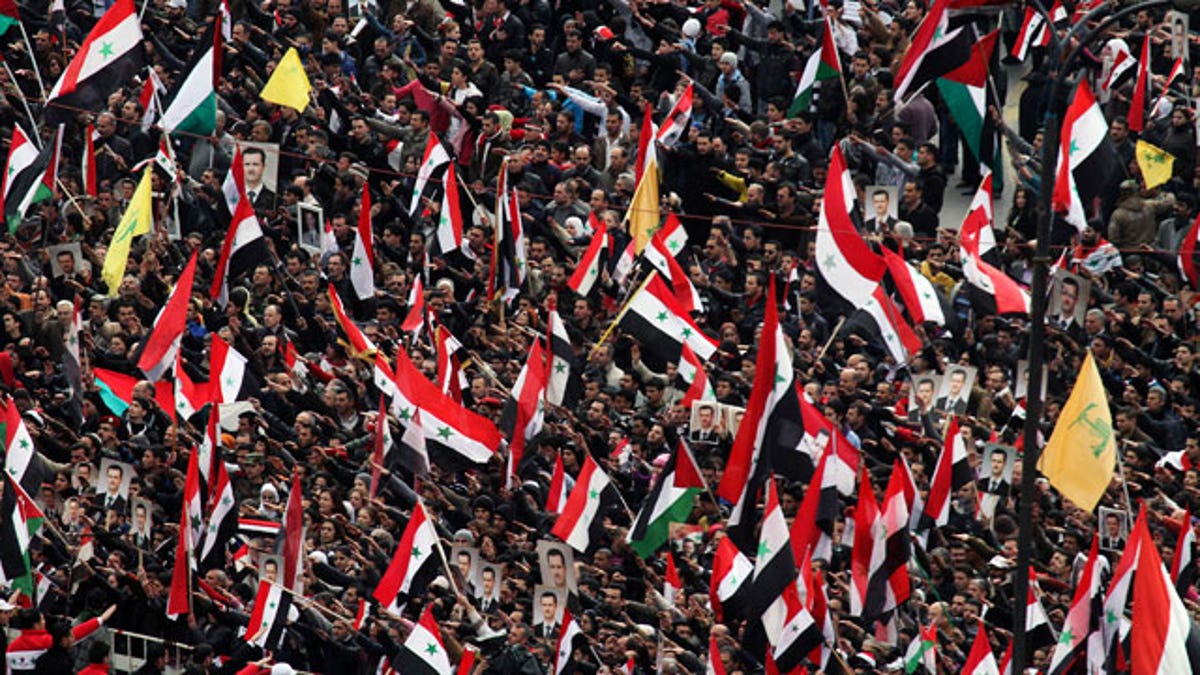
Jan. 11, 2012: Pro-Syrian regime protesters wave the national flag, as well as Hezbollah flags, in yellow, as they gather during a demonstration to show support for Syrian President Bashar Assad at a central square in Damascus, Syria.
BEIRUT -- The death of a French TV cameraman during a government-sponsored trip to Syria has renewed calls for an independent assessment of the violent conflict in the country, as the government and the opposition traded blame Thursday.
The French government, human rights groups and the opposition demanded an independent investigation into the killing of Gilles Jacquier while filming a pro-government rally in the restive city of Homs Wednesday.
Jacquier, who worked for France-2 Television, became the first Western journalist to be killed in the 10-month-old Syrian uprising.
He was among a group of 15 journalists on the government trip when they were hit by several grenades, and his death was likely to become a rallying cry for both sides.
The opposition called for protests in Jacquier's honor Thursday, and activists said hundreds of people held demonstrations across the country in cold and rainy weather, demanding the downfall of President Bashar Assad.
The government has said the attack shows the uprising is the work of terrorists, a narrative the government has maintained since the start of the revolt against Assad ten months ago. The opposition contends the regime is behind the bloodshed, to tarnish the uprising.
"The journalists were attacked in a heavily militarized regime stronghold -- it would be hugely difficult for any armed opposition to penetrate the area and launch such a deadly attack," said Wissam Tarif, a campaigner for online global activist group, Avaaz.
Nadim Houry, a senior researcher at Human Rights Watch, called for an independent, preferably international, investigation.
"Yesterday's case of the killing of the French journalist raises a number of questions, who launched the attacks, what was the purpose. The answer is we don't know," he said in an interview in Beirut Thursday. "So at this point, what's important is again to launch a credible investigation."
State-run news agency SANA said the government organized tour for journalists comes in the framework of the Syrian government's acceptance for the foreign media "to move freely" in Syria.
Syria has banned almost all foreign journalists from Syria since the start of the uprising in March, and only recently started issuing short term visas for a limited number of journalists, who are allowed to move only accompanied by government minders.
"It's up to Syrian authorities to ensure the security of international journalists on their territory," French Foreign Minister Alain Juppe said Wednesday.
During the uprising, several Syrian journalists have been killed or tortured as they tried to cover the revolt, which has proven the most serious challenge to the Assad family's 40-year dynasty.
With the U.N. estimate of more than 5,000 dead since March, it is among the bloodiest uprisings of the Arab Spring.
